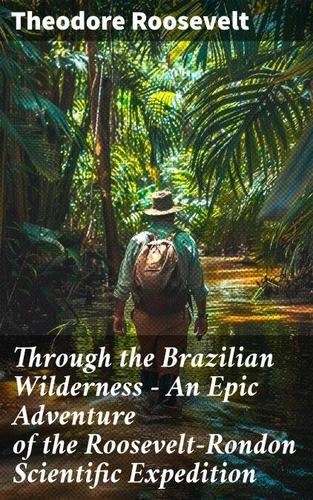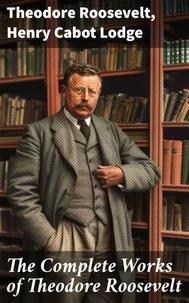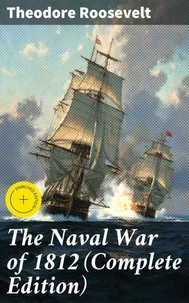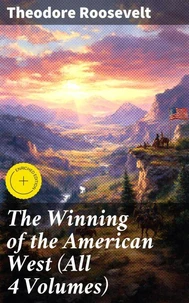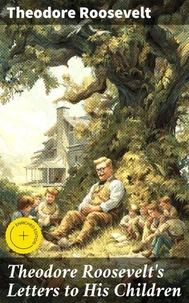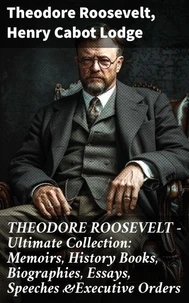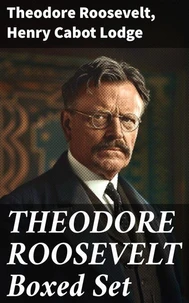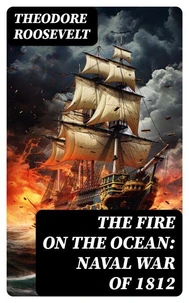Through the Brazilian Wilderness - An Epic Adventure of the Roosevelt - Rondon Scientific Expedition. Traversing the Enigmatic Amazon Rainforest
Par :Formats :
Disponible dans votre compte client Decitre ou Furet du Nord dès validation de votre commande. Le format ePub est :
- Compatible avec une lecture sur My Vivlio (smartphone, tablette, ordinateur)
- Compatible avec une lecture sur liseuses Vivlio
- Pour les liseuses autres que Vivlio, vous devez utiliser le logiciel Adobe Digital Edition. Non compatible avec la lecture sur les liseuses Kindle, Remarkable et Sony
 , qui est-ce ?
, qui est-ce ?Notre partenaire de plateforme de lecture numérique où vous retrouverez l'ensemble de vos ebooks gratuitement
Pour en savoir plus sur nos ebooks, consultez notre aide en ligne ici
- Nombre de pages261
- FormatePub
- ISBN859-65--4781325-5
- EAN8596547813255
- Date de parution17/01/2024
- Protection num.Digital Watermarking
- Taille1 Mo
- Infos supplémentairesepub
- ÉditeurGOOD PRESS
Résumé
In "Through the Brazilian Wilderness", Theodore Roosevelt offers readers a captivating firsthand account of the Roosevelt-Rondon Scientific Expedition of 1913-1914, an audacious adventure that traversed the untamed terrain of the Amazon rainforest. This narrative is not just an exploration of geography; it is a profound meditation on nature, human endurance, and the complexities of civilization versus wilderness.
Roosevelt's evocative prose, marked by vivid imagery and an infectious enthusiasm for discovery, situates the book within early 20th-century American literature, reflecting the era'Äôs fascination with exploration and the natural world. The text masterfully intertwines adventure with scientific inquiry, showcasing Ecuador's diverse ecosystems and its indigenous cultures, thereby enriching the reader'Äôs understanding of both the adventure genre and environmental history.
Theodore Roosevelt, the 26th President of the United States, was not only a statesman but also a fervent nature enthusiast and conservationist. His experiences, both in the rugged terrains of the American West and during this Brazilian journey, profoundly shaped his perspectives on conservation and the intrinsic value of unspoiled lands. Roosevelt's pursuit of adventure and knowledge is a testament to his character, as he once said, "Far better it is to dare mighty things, to win glorious triumphs, even though checkered by failure'Ķ than to rank with those poor spirits who neither enjoy much nor suffer much." Readers looking for an exhilarating intersection of adventure, scientific discovery, and historical context are highly encouraged to explore "Through the Brazilian Wilderness".
Roosevelt'Äôs narrative is not just an account of a journey; it is a clarion call to appreciate the natural world and recognize the significance of conservation, making it a vital read for historians, nature lovers, and explorers alike.
Roosevelt's evocative prose, marked by vivid imagery and an infectious enthusiasm for discovery, situates the book within early 20th-century American literature, reflecting the era'Äôs fascination with exploration and the natural world. The text masterfully intertwines adventure with scientific inquiry, showcasing Ecuador's diverse ecosystems and its indigenous cultures, thereby enriching the reader'Äôs understanding of both the adventure genre and environmental history.
Theodore Roosevelt, the 26th President of the United States, was not only a statesman but also a fervent nature enthusiast and conservationist. His experiences, both in the rugged terrains of the American West and during this Brazilian journey, profoundly shaped his perspectives on conservation and the intrinsic value of unspoiled lands. Roosevelt's pursuit of adventure and knowledge is a testament to his character, as he once said, "Far better it is to dare mighty things, to win glorious triumphs, even though checkered by failure'Ķ than to rank with those poor spirits who neither enjoy much nor suffer much." Readers looking for an exhilarating intersection of adventure, scientific discovery, and historical context are highly encouraged to explore "Through the Brazilian Wilderness".
Roosevelt'Äôs narrative is not just an account of a journey; it is a clarion call to appreciate the natural world and recognize the significance of conservation, making it a vital read for historians, nature lovers, and explorers alike.
In "Through the Brazilian Wilderness", Theodore Roosevelt offers readers a captivating firsthand account of the Roosevelt-Rondon Scientific Expedition of 1913-1914, an audacious adventure that traversed the untamed terrain of the Amazon rainforest. This narrative is not just an exploration of geography; it is a profound meditation on nature, human endurance, and the complexities of civilization versus wilderness.
Roosevelt's evocative prose, marked by vivid imagery and an infectious enthusiasm for discovery, situates the book within early 20th-century American literature, reflecting the era'Äôs fascination with exploration and the natural world. The text masterfully intertwines adventure with scientific inquiry, showcasing Ecuador's diverse ecosystems and its indigenous cultures, thereby enriching the reader'Äôs understanding of both the adventure genre and environmental history.
Theodore Roosevelt, the 26th President of the United States, was not only a statesman but also a fervent nature enthusiast and conservationist. His experiences, both in the rugged terrains of the American West and during this Brazilian journey, profoundly shaped his perspectives on conservation and the intrinsic value of unspoiled lands. Roosevelt's pursuit of adventure and knowledge is a testament to his character, as he once said, "Far better it is to dare mighty things, to win glorious triumphs, even though checkered by failure'Ķ than to rank with those poor spirits who neither enjoy much nor suffer much." Readers looking for an exhilarating intersection of adventure, scientific discovery, and historical context are highly encouraged to explore "Through the Brazilian Wilderness".
Roosevelt'Äôs narrative is not just an account of a journey; it is a clarion call to appreciate the natural world and recognize the significance of conservation, making it a vital read for historians, nature lovers, and explorers alike.
Roosevelt's evocative prose, marked by vivid imagery and an infectious enthusiasm for discovery, situates the book within early 20th-century American literature, reflecting the era'Äôs fascination with exploration and the natural world. The text masterfully intertwines adventure with scientific inquiry, showcasing Ecuador's diverse ecosystems and its indigenous cultures, thereby enriching the reader'Äôs understanding of both the adventure genre and environmental history.
Theodore Roosevelt, the 26th President of the United States, was not only a statesman but also a fervent nature enthusiast and conservationist. His experiences, both in the rugged terrains of the American West and during this Brazilian journey, profoundly shaped his perspectives on conservation and the intrinsic value of unspoiled lands. Roosevelt's pursuit of adventure and knowledge is a testament to his character, as he once said, "Far better it is to dare mighty things, to win glorious triumphs, even though checkered by failure'Ķ than to rank with those poor spirits who neither enjoy much nor suffer much." Readers looking for an exhilarating intersection of adventure, scientific discovery, and historical context are highly encouraged to explore "Through the Brazilian Wilderness".
Roosevelt'Äôs narrative is not just an account of a journey; it is a clarion call to appreciate the natural world and recognize the significance of conservation, making it a vital read for historians, nature lovers, and explorers alike.

